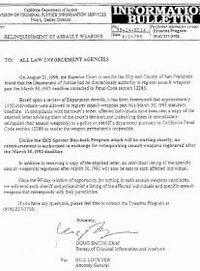meerschm said:a grammarian would remind you that commas separate independent clauses in a compound sentence. the structure is a single sentence, with a period at the end. I would contend that you have to read the whole thing. and that focus on any subset is to support your independent view, not a read on what the author intended. in this sentence, keeping arms is tied to security of the state, and somehow to a well regulated militia.
I do not disagree that you have the right to have your opinion. I am glad you are engaged in discussion of it.
The second amendment clearly states that it is the right of the people to keep and bear arms. The purpose of the Bill of Rights was to protect the unalienable rights of the people against a too powerful government. These rights are not granted by the government, they are protected from the government. As was stated above, there is ample proof from the Federalist papers that the founders considered it an individual right, but you say we shouldn't focus on what the authors intended but on what the amendment says. Lets look at what it says then. "A well regulated militia", at the time, a well regulated militia meant a well trained militia, and the militia was every able-bodied male with his own arms. So far we have all able bodied males who are well trained with their arms. The next part, " being necessary to the security of a free state" then means that the security of a free state is dependent on the people being armed and well trained. Since we are looking at exactly what it says, there is also the argument that state could refer to a state of being, as in a state of freedom. Grammatically just as plausible as a physical State. The right of the PEOPLE to keep and bear arms shall not be infringed", is pretty clear that it protects the peoples' right and not the state. And your argument is the placement of commas??? Or is it, in the constitution, when they say State they mean State, and when they say People they mean People, except in the 2nd amendment when they say State they mean State, and when they say People they mean State. I found your conclusion pretty interesting, too. "...in this sentence, keeping arms is tied to security of the state, and somehow to a well regulated militia." If we use logic instead of sophistry, Well regulated militia is tied to security of free state, not keeping and bearing arms, which is tied to the right of the People. Then , after you writing about being exact, you conclude with and "somehow" to a well regulated militia. SOMEHOW!!! How??? So much for details. Bottom line, everyone has their opinions and they are entitled to them. The 2nd amendment is clear in what it says and what the authors intended. If you disagree then you should form your argument that you don't think the amendment should apply any longer and not just try to change the meaning. Maybe you would be happy with a constitution that could be easily changed with the times (living document) and is subject to the whims of politicians, I know I prefer the politicians to be subject to the Constitution.



 . If I'm wrong, please correct me.
. If I'm wrong, please correct me.



